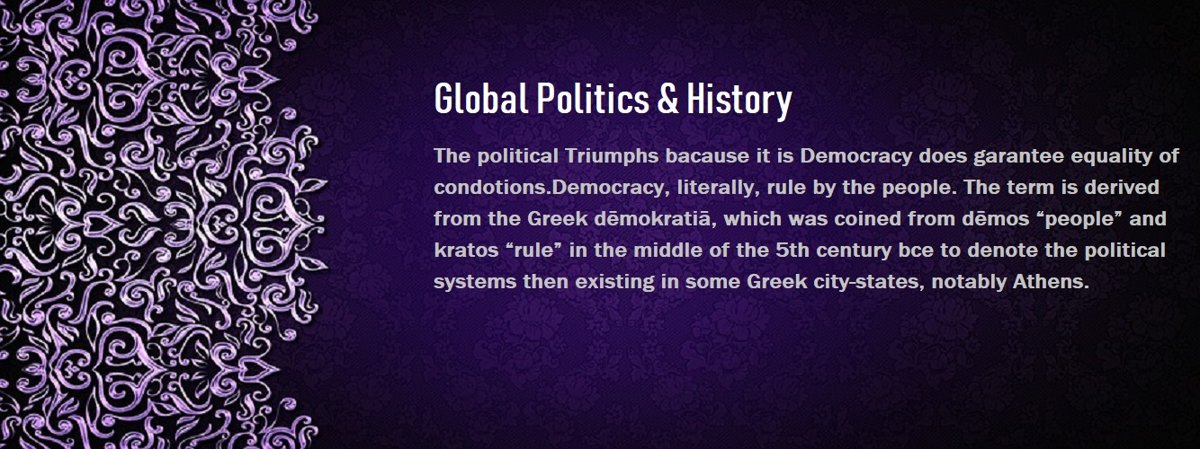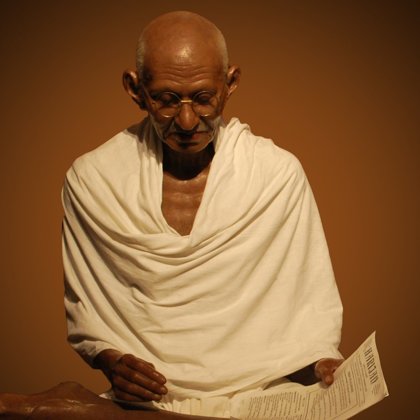INDIA'S MAHATMA GANDHI (1869-1948) SPENT HIS LIFE WORKING FOR INDIA FREEDOM FROM BRITISH RULE. HE USED THE "NON VIOLENCE AS WEAPON".HE WAS THE MAN OF PEACE,BUT IRONICALLY HE NEVER WON THE PEACE PRIZE.MAHATMA GANDHI IS AFFECTIONATELY CALLED IN INDIA AS FATHER OF THE NATION.
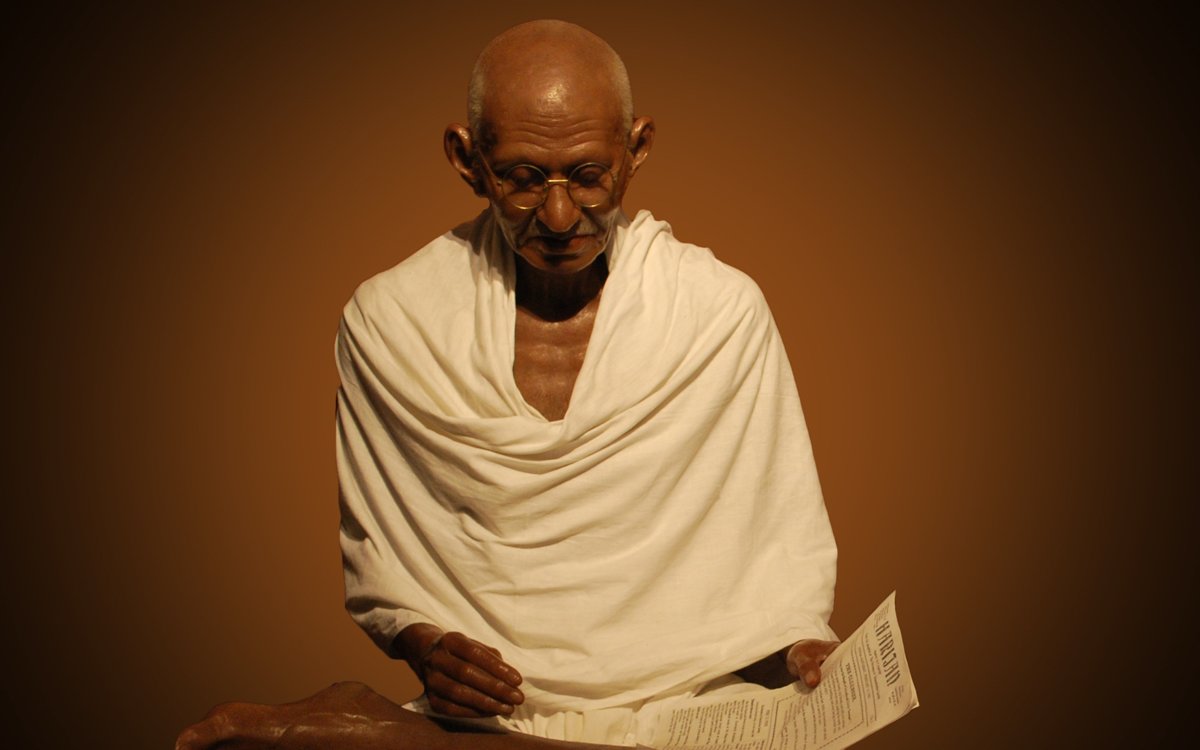 He was the man of peace, but ironically he never won the Nobel Peace Prize, although he was nominated 5 times for it, in 1937, 1938, 1939 and 1947. Mahatma Gandhi was chosen for the Nobel Peace Prize in 1948, but he was assassinated before it was conferred to him. In response to this, the Nobel Committee decided not to award the Peace Prize for that year.Around 53 major roads in India and 48 roads around the other parts of the world are named after him.
He was the man of peace, but ironically he never won the Nobel Peace Prize, although he was nominated 5 times for it, in 1937, 1938, 1939 and 1947. Mahatma Gandhi was chosen for the Nobel Peace Prize in 1948, but he was assassinated before it was conferred to him. In response to this, the Nobel Committee decided not to award the Peace Prize for that year.Around 53 major roads in India and 48 roads around the other parts of the world are named after him.
Mahatma Gandhi, was a political figure, a social and political reformer, a humanist, a visionary and a spiritual leader, who took the country on the road to freedom. Gandhi, popularly known as the Mahatma, not only led the freedom struggle in India but also performed a pivotal role in the struggle of the Indians for civil rights in South Africa.South Africa was the crucible that forged Gandhi’s identity as a political activist and was an important prelude to his return to India, where he played a pivotal role in securing its independence from British rule in August 1947.Mohandas Karamchand Gandhi (his birth name) arrived in South Africa in 1893 at the relatively tender age of 24 as a newly qualified lawyer on a temporary assignment to act on behalf of a local Indian trader in a commercial dispute. What was meant to be a short stopgap for the struggling young lawyer turned into a 21-year stay, with spells in India and England.By the time Gandhi left South Africa for the last time in 1914, he had already earned the appellation Mahatma (or Great Soul) for his work in securing significant legal concessions for the local Indian population in South.Being shy, Gandhi couldn’t carry on his practice as lawyer in India as he couldn’t cross question his witnesses or put up speeches. In fact, while delivering a speech, his knees and hands would often tremble.During his initial days in South Africa, Gandhi served voluntarily in the British Army for medical ill, as the stretcher bearer in the Boer-War. The horrors of the war further solidified Gandhi’s fierce belief in the idea of non-violence.Gandhi, as a lawyer to Dada Abdulla & Co. in Natal, South Africa, was paid 15,000 dollars every year at the time. If adjusted to inflation today, that value would be Rs. 12,13,960 per annum which would put him in the top 5% richest Indians, but he gave that up to return to India and work as a ‘satyagrahi’.In 1921, seeing the astounding poverty in Madurai, where people had no clothes to wear; Gandhi gave up his clothes and decided to make ‘dhoti’ his permanent attire. He also got bald.In 1930, Mohandas Gandhi was named the Man of the Year by TIME Magazine. Now this coveted title is popularly known as the “TIME Person Of The Year”. No other Indian has ever been TIME’s Person of the Year since then.Gandhi was also the runner-up for the title of the TIME’s Man of the Century; the title going to none other than Albert Einstein.One of the greatest leaders that the world has ever seen, Mahatma Gandhi, was a political figure, a social and political reformer, a humanist, a visionary and a spiritual leader, who took the country on the road to freedom. Gandhi, popularly known as the Mahatma, not only led the freedom struggle in India but also performed a pivotal role in the struggle of the Indians for civil rights in South Africa.During his early days in South Africa, he served voluntarily in the British Army in the Zulu war for medical ill, as the stretcher bearer in the Boer-War. Gandhi also supported the British in their war efforts during the first world war.During his 40 years of struggle, Gandhi wrote around 10 million words i.e. around 700 words every day, which covered politics like Independence to social issues like abolishing child marriage, prohibition of alcohol, untouchability, cleanliness and nation building. He also worked as an editor for several English, Hindi and Gujarati newspapers in India as well as South Africa, including the Harijan, Indian Opinion (South Africa) and the Young India.
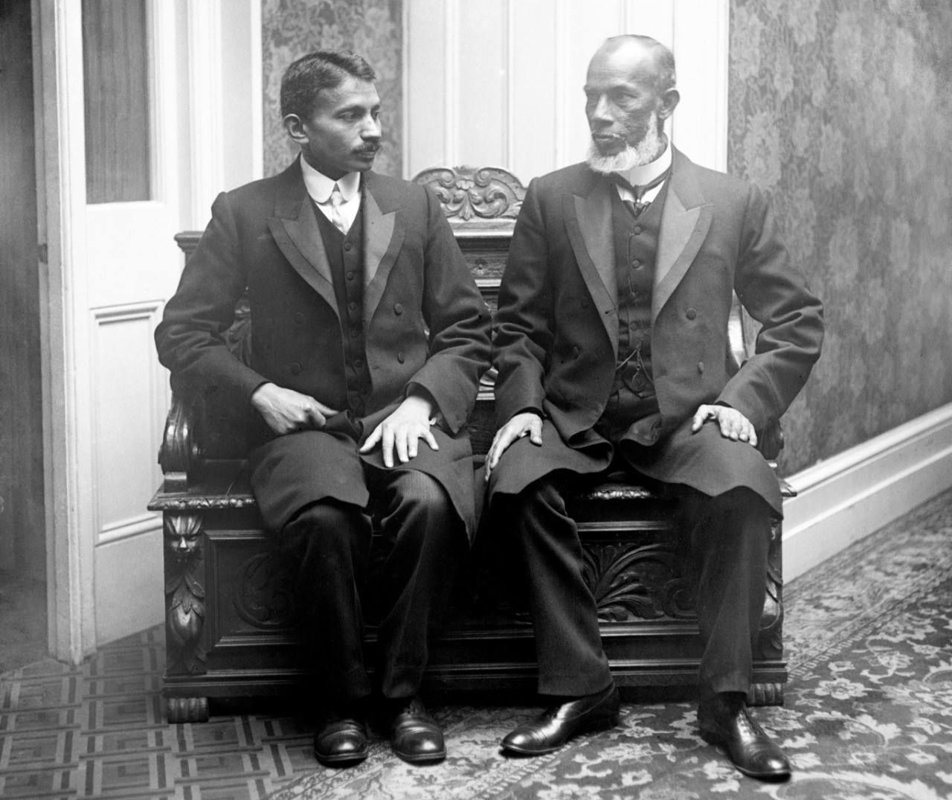 Mahatma Gandhi with a friend in South Africa, circa 1900.As a young lawyer in South Africa, Gandhi (left )took up the fight against racial oppression.He said:"I realised the true function of a lawyer was to unite parties riven asunder.” Mahatma Gandhi in South Africa as Part of a Delegation of British Indians.
Mahatma Gandhi with a friend in South Africa, circa 1900.As a young lawyer in South Africa, Gandhi (left )took up the fight against racial oppression.He said:"I realised the true function of a lawyer was to unite parties riven asunder.” Mahatma Gandhi in South Africa as Part of a Delegation of British Indians.
Mahatma Gandhi was born as Mohandas Karamchand Gandhi on 2nd October 1869. Born and raised in a Hindu merchant caste family in coastal Gujarat, western India, and trained in law at the Inner Temple, London, Gandhi first employed nonviolent civil disobedience as an expatriate lawyer in South Africa, in the resident Indian community's struggle for civil rights. After his return to India in 1915, he set about organising peasants, farmers, and urban labourers to protest against excessive land-tax and discrimination. Assuming leadership of the Indian National Congress in 1921, Gandhi led nationwide campaigns for various social causes and for achieving Swaraj or self-rule.Gandhi famously led Indians in challenging the British-imposed salt tax with the 400 km (250 mi) Dandi Salt March in 1930, and later in calling for the British to Quit India in 1942. He was imprisoned for many years, upon many occasions, in both South Africa and India. He lived modestly in a self-sufficient residential community and wore the traditional Indian dhoti and shawl, woven with yarn hand-spun on a charkha. He ate simple vegetarian food, and also undertook long fasts as a means of both self-purification and political protest.At the peak of World War II, Gandhi launched Quit India Movement to get rid of the British but little do we know that the Japanese at that point were at the doorsteps of India. The battles of Kohima and Imphal took place where the Japanese forces were denied entry into Indian hinterlands. Had the Japanese entered India via that route, the result would have been immense bloodshed, suffering, rapes and more as happened in China and some other Asian countries. When the Japanese were at the doorstep, Gandhi said that Indians should surrender to the invading forces and should show non-cooperation to make the Japanese feel unwanted. Basically, Gandhi was asking Indians to make way for anarchy!And during WWII when Hitler’s Nazi forces were on the loose, a reporter asked what should have the Jews done? Should they have committed mass suicide? Gandhi replied in affirmation saying that that would have been a heroic deed. He said that the Jews should have jumped off the cliff into the sea and that would have been more significant!In fact, the list can get so long that once you finish reading, you will invariably want history to be rewritten. You will invariable want to travel through time and rid the world of Gandhi before he started his screwed up, corrupt and pathetic views that eventually made India impotent and pushed back her independence by years. Gandhi was no saint. He was a pathetic racist, who should be completely erased out of history not just in India but in the rest of the world as well. He doesn’t deserve the title “Father of the Nation”. His image should be removed from Indian currency notes and he should be denounce in every street or every town and village in every state of India. Gandhi was just a nuisance.Gandhi spoke English with a tinge of an Irish accent because one of his first English teachers was Irish.During his movement, he used to walk around 18 km every day, nearly for 40 years. During his campaign from 1913 to 1938, he walked around 79,000 km, equivalent to encompassing the Earth twice.Gandhi experimented with smoking with his elder brother, but he soon quit smoking, finding it distasteful. Then he experimented with meat-eating with a Muslim friend as he was convinced that the English were able to rule India because they ate meat. This magnetic leader wasn’t a convincing lawyer. He couldn’t carry on his practice as a lawyer in India due to his poor ability to cross-question his witnesses or put up speeches. In fact, while delivering a speech, his knees and hands would often tremble.Gandhi denounced Gandhism and did not want to create a cultlike following. He also conceded that he had “nothing new to teach the world. Truth and nonviolence are as old as the hills.Through a prearranged marriage, Gandhi was wed at age 13, his wife was one year older.Gandhi and his wife had their first child when he was 15 years old. That child died a few days later, but the couple did have four sons before he took a vow of celibacy.Gandhi's wife died in prison in 1944, he was also in prison at the time of her death. Gandhi was released from prison only because he contracted malaria, and British officials feared an uprising if he, too, died while in prisonDespite being famous for nonviolence and the Indian independence movement, Gandhi actually recruited Indians to fight for Britain during World War I. He opposed India's involvement in World War II.
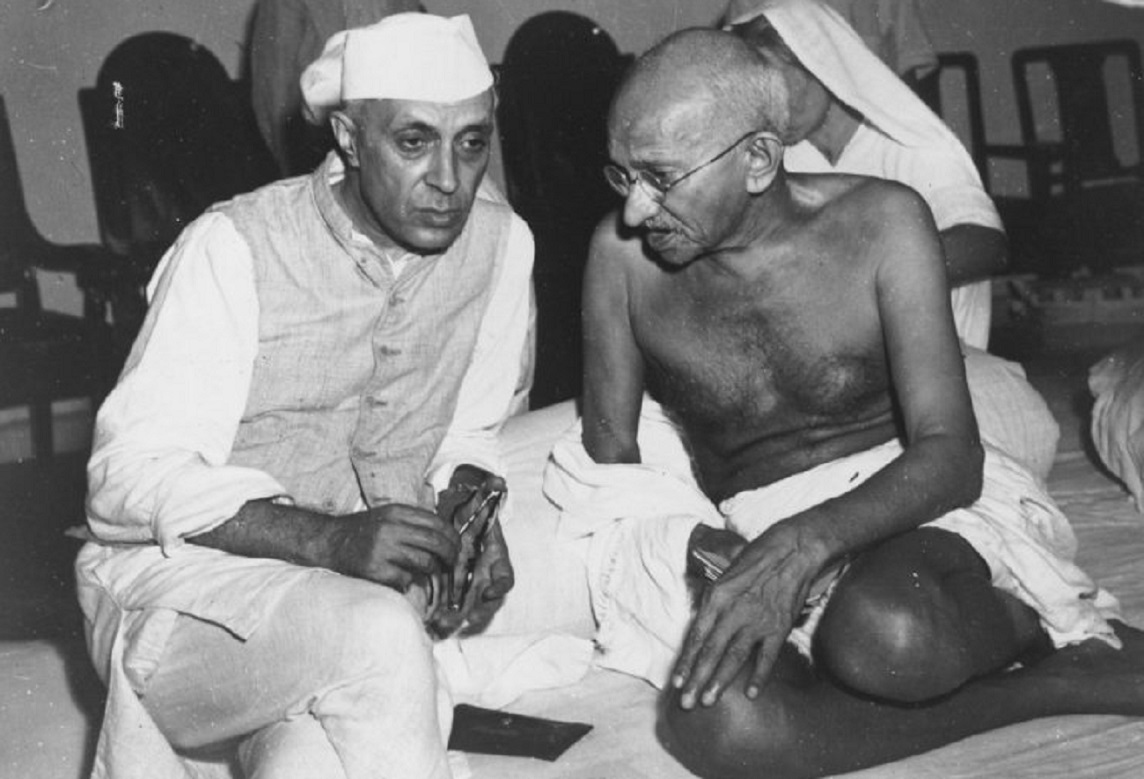 Jawaharlal Nehru and Mahatma Gandhi in conversationThe Quit India Movement was a civil disobedience movement launched in India in August 1942 in response to Mohandas Gandhi’s call for immediate independence. The All-India Congress Committee proclaimed a mass protest demanding what Gandhi called “an orderly British withdrawal” from India. The call for determined, but passive resistance appears in his call to Do or Die, issued on 8 August at the Gowalia Tank Maidan in Bombay.
Jawaharlal Nehru and Mahatma Gandhi in conversationThe Quit India Movement was a civil disobedience movement launched in India in August 1942 in response to Mohandas Gandhi’s call for immediate independence. The All-India Congress Committee proclaimed a mass protest demanding what Gandhi called “an orderly British withdrawal” from India. The call for determined, but passive resistance appears in his call to Do or Die, issued on 8 August at the Gowalia Tank Maidan in Bombay.
Gandhi was a fierce proponent of civil and political equality. He struggled to see equality in the nations of South Africa as well as in his home country of India. Though born in India, Gandhi relocated to South Africa in 1893 in order to join in the struggle to end discrimination against Indians in the country.It was in South Africa that Gandhi experienced intense racial prejudice in an up-close and personal fashion. A long history of legislation restricting the legal rights and educational opportunities for non-whites existed in South Africa and these restrictions were only becoming more aggressive as South Africa pushed toward widespread apartheid. As a lawyer, Gandhi felt compelled to combat this injustice. For the next two decades, he devoted himself to opposing the government of South Africa and its unfair treatment of Indian people through nonviolent and non-compliant protest.After years of struggle in South Africa, Gandhi returned home to India in 1914. Like South Africa, India was also in a state of disarray. When Gandhi returned to India it was still a British colony divided along religious lines with great conflicts between Muslims and Hindus. A caste system was also firmly in place that left many people incapable of living lives of equality. The caste system in India determined the life an individual could live by regulating social standing and employment opportunity. In this system, some members are even considered 'untouchable'. These individuals are outcast from society and doomed for poverty.Because of both the political and social injustices Gandhi saw when he returned to India, he would continue his non-violent struggle for equality, also known as 'Satyagraha'. Satyagraha refers to the principle introduced by Gandhi that evil must be confronted with a search for peace through nonviolent means. Gandhi's ultimate goal was a free and fair India ruled by the people of India. He desired an India that treated all citizens equally, an end to the caste system, and the end to oppressive taxation practices.It might seem that Gandhi's peaceful approach would be favorably received. However, Gandhi's efforts landed him in jail on several occasions. He received a six-year jail sentence in 1922. However, he was released after two years served.Gandhi's strategy was one of unwavering dedication and included some unorthodox methods. He would often go on hunger strikes, or long, lengthy fasts, during which he refused to eat until justice prevailed. Despite numerous difficulties, Gandhi always remained dedicated to his cause. He became known as the 'Father of India' and earned the love and respect of millions throughout his life. In 1945, as a result of much of Gandhi's dedicated effort, Britain began the negotiations necessary to free India of British rule. The result of these negotiations was the Mountbatten Plan developed in June of 1947. This plan would allow India to become free of British rule, but years of turmoil inevitably followed. While progress was undoubtedly made towards his beloved cause, Gandhi did not live to see a unified, completely free India, as his life was cut short when he was assassinated by Nathuram Godse on January 30, 1948.
Mahatma Gandhi maintained a regular contact with many great ..
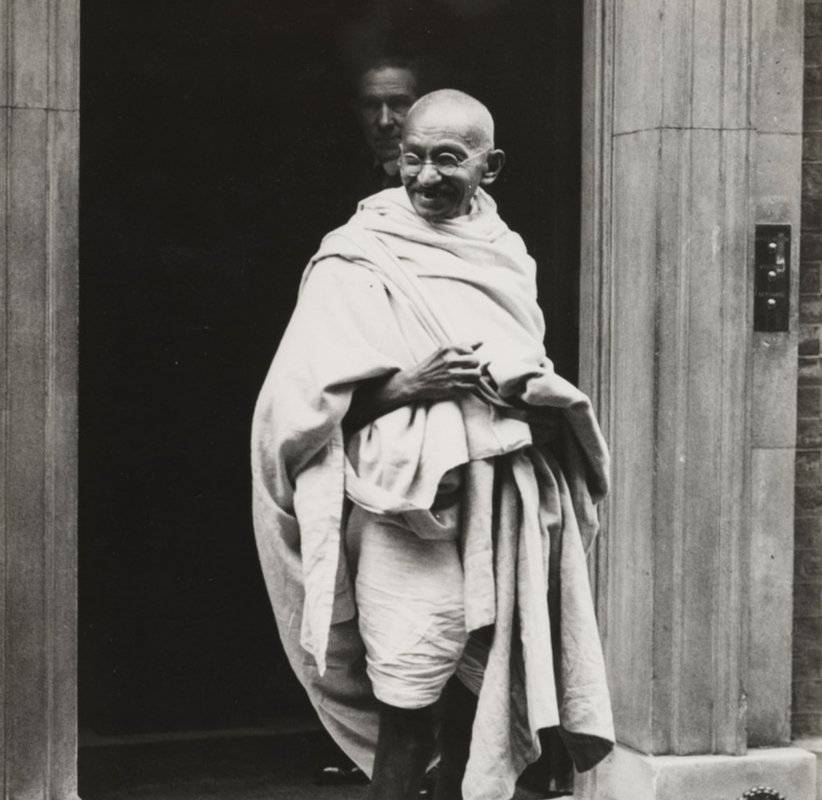 3th November 1931: Indian leader Mahatma Gandhi , outside 10 Downing Street, London after he visited the British Prime Minister Ramsay MacDonald, 1931 - . He is in London to attend the Round Table Conference on Indian constitutional reform.
3th November 1931: Indian leader Mahatma Gandhi , outside 10 Downing Street, London after he visited the British Prime Minister Ramsay MacDonald, 1931 - . He is in London to attend the Round Table Conference on Indian constitutional reform.
In the year 1888, Gandhi went to University College of London to study as a barrister. He came back to India after being called to the bar of England and Wales by Inner Temple. In 1893, he accepted a yearlong contract from an Indian firm to a post in Natal, South Africa. There, he faced racial discrimination directed at blacks and Indians. Such incidents provoked him to work towards social activism.The Champaran Agitation and Kheda Satyagraha of 1918 was the first major success of Mahatma Gandhi in his struggle towards India's freedom. The reason for the agitation was the levy of an oppressive tax by the British, which they insisted on increasing further. He organized his supporters as well as volunteers to protest against this atrocity and also began leading the clean up of villages, building of schools and hospitals as well as encouraging the village leadership to condemn the numerous social evils affecting the society. Mahatma Gandhi was successful in signing an agreement with the British, wherein the poor farmers were granted more compensation and control over farming. Quit India Movement.As the World War II progressed, Mahatma Gandhi intensified his protests for the complete independence of the Indian subcontinent. He drafted a resolution calling for the British to Quit India. The 'Quit India Movement' or the 'Bharat Chhodo Andolan' was the most aggressive revolt of the INC, with the aim of gaining complete exit of the British from India. Gandhi was arrested on 9th August 1942 and held for two years in the Aga Khan Palace in Pune. There, he lost his secretary, Mahadev Desai and his wife, Kasturba. The Quit India Movement came to an end by the end of 1943, when the British gave hints that complete power would be transferred to the people of India.Once back in India, Gandhi led the fight for Indian independence from the British Empire. He organized several non-violent civil disobedience campaigns. During these campaigns, large groups of the Indian population would do things like refusing to work, sitting in the streets, boycotting the courts, and more. Each of these protests may seem small by themselves, but when most of the population does them at once, they can have an enormous impact. Gandhi was put in prison several times for organizing these protests. He would often fast (not eat) while he was in prison. The British government would eventually have to release him because the Indian people had grown to love Gandhi. The British were scared what would happen if they let him die. One of Gandhi's most successful protests was called the Salt March. When Britain put a tax on salt, Gandhi decided to walk 241 miles to the sea in Dandi to make his own salt. Thousands of Indians joined him in his march. Gandhi also fought for civil rights and liberties among Indian people.
 Mahatma Gandhi spent six years in prison for peacefully challenging British rule in India.Independence was won in 1947.During his 40 years of struggle in India, Mahatma Gandhi penned around 10 million words i.e. around 700 words everyday, that covered various topics of politics like Independence to social issues like abolishment of child-marriage, prohibition of alcohol, untouchability, cleanliness and nation building.
Mahatma Gandhi spent six years in prison for peacefully challenging British rule in India.Independence was won in 1947.During his 40 years of struggle in India, Mahatma Gandhi penned around 10 million words i.e. around 700 words everyday, that covered various topics of politics like Independence to social issues like abolishment of child-marriage, prohibition of alcohol, untouchability, cleanliness and nation building.
 In 1939, when the British had declared that India was a party to the war (World War II), the Congress criticised the decision as having been taken without Indian consent. Provincial Congress ministries resigned in protest. The Quit India movement swept across the country even in the absence of its leaders, convincing the British that they could no longer continue to rule India.
In 1939, when the British had declared that India was a party to the war (World War II), the Congress criticised the decision as having been taken without Indian consent. Provincial Congress ministries resigned in protest. The Quit India movement swept across the country even in the absence of its leaders, convincing the British that they could no longer continue to rule India.
Assassination,the inspiring life of Mahatma Gandhi came to an end on 30th January 1948, when he was shot by Nathuram Godse. The belligerence of Muslims was a result of Gandhi's policy of appeasement.Scrutinized in the light of recorded history, these prove to be clever distortions to misguide the gullible. Gandhi in those days was very active in the rough and tumble of politics. The proposal for partition of the country and violent reaction against it generated tensions which ultimately resulted in sectarian killings on a scale unprecedented in human history. For the ethnic Muslims, Gandhi was a Hindu leader who opposed the creation of Pakistan on sectarian grounds. Ethnic Hindus looked upon him as an impediment to their plan to revenge the atrocities on Hindus. Godse was a child of this extremist thinking.The assassination of Gandhi was a culmination of decades of systematic brain-washing. Gandhi had become a thorn in the flesh of the hard core Hindus and in course of time this resentment turned into a phobia. Beginning with the year 1934 over a period of 14 years on as many as six occasions attempts were made to kill Gandhi.The last one by Godse on 30-1-48 was successful. The remaining five were made in 1934, during the months of July and September 1944, September 1946 and on 20th January 1948. Godse was involved in two previous attempts. When the unsuccessful attempts of 1934, 1944 and 1946 were made, the proposal regarding the partition and the matter regarding release of Rs. 55 crore to Pakistan were not in existence at all. The conspiracy to do away with Gandhiji was conceived much earlier. The grounds advanced for this heinous crime are clever rationalization to hoodwink the gullible. The staging of the play entitled, "Mee Nathuram Godse Boltoy" is a clear proof of the fact that the mindset that led to Gandhi's assassination has not disappeared from our national psyche.A civil society is wedded to the democratic method of resolving differences by a frank and open debate and evolving a working consensus. Gandhi was always open to persuasion. Gandhi had invited Godse for discussions but the latter did not avail of this opportunity given to him. This is indicative of the lack of faith in the democratic way of resolving differences on the part of Godse and his ilk. Such fascist mindset seeks to do away with dissent by liquidating the opponents.The Hindu backlash was as much responsible for the creation of Pakistan as the sentiments of the ethnic Muslims. The hard core Hindus looked down upon the Muslims as misguided "Mlechchh" - unclean and came to believe that coexistence with them was not possible. Mutual distrust and recriminations led the extremists among both the groups to regard Hindus and Muslims as different nationalities and this strengthened the Muslim League's demand for partition as the only possible solution to the communal problem. Vested interests on both the sides stirred up the separatist sentiment and sought to justify their hate - campaign by clever and selective distortion of history. It is indeed a matter for serious concern for the nation that this mentality has not disappeared .Poet Mohamed Iqbal who wrote the famous song "Sare Jahanse Acchchha Hindostan Hamara" was the first to formulate the concept of a separate State for Muslims as early as 1930. Needless to state that this sentiment, in a sense, was strengthened by the Hindu extremists. In 1937, at the open session of the Hindu Mahasabha held at Ahmedabad, Veer Savarkar in his presidential address asserted: "India cannot be assumed today to be Unitarian and homogenous nation, but on the contrary there are two nations in the main - the Hindus and the Muslims. The most perplexing and yet a pertinent question was Mr. Jinnah's most vocal propagation of the idea of Pakistan. With the intentional or otherwise efforts of Mountbatten, he succeeded in carving it out. Then, instead of making the two his targets why did Godse select one for murder who vehemently opposed the idea of partition till the resolution by the Congress accepting the partition of the country was passed on 3rd June 1947 and Pakistan became fate accompli? Or is it that, as Savarkar put it, he had no quarrel with Mr. Jinnah and his two-nation theory but, can one surmise that he and his apologists had real quarrel with Gandhi and Gandhi alone?In view of this, Gandhi acquiesced into the situation. It is necessary to point out an aspect of Gandhi's personality that made him a source of unabated distrust and dislike in the eyes of hard core Hindus. Though he was a devout Hindu, he had the most amicable and warm relations with many who did not belong to the Hindu fold. As a result of this exposure he had developed an eclectic religious sense based on oneness of God and equality of all religious sense based on oneness of God and equality of all religions. Caste divisions and untouchability prevalent among the Hindu social organization distressed him immensely. He advocated and actively encouraged inter-caste marriages. Lastly he blessed only those marriages wherein one of the partners belonged to the untouchable castes. Vested interests amongst high caste Hindus viewed this reformist and other religious programmes with bitter resentment. In course of time it developed into a phobia and thus he became anathema to them.Nathuram was a Hindu radical, who held Gandhi responsible for weakening India by ensuring the partition payment to Pakistan. Godse and his co-conspirator, Narayan Apte, were later tried and convicted. They were executed on 15th November 1949.The killer of Gandhiji and his apologists sought to justify the assassination on the following arguments.Gandhi supported the idea of a separate State for Muslims. In a sense he was responsible for the creation of Pakistan.In spite of the Pakistani aggression in Kashmir, Gandhi fasted to compel the government of India to release an amount of Rs. 55 crores due to Pakistan.The belligerence of Muslims was a result of Gandhi's policy of appeasement.Scrutinized in the light of recorded history, these prove to be clever distortions to misguide the gullible. Gandhi in those days was very active in the rough and tumble of politics. The proposal for partition of the country and violent reaction against it generated tensions which ultimately resulted in sectarian killings on a scale unprecedented in human history. For the ethnic Muslims, Gandhi was a Hindu leader who opposed the creation of Pakistan on sectarian grounds. Ethnic Hindus looked upon him as an impediment to their plan to revenge the atrocities on Hindus.Gandhi believed, was the king of exercises and hence he preferred transporting via walking even to great distances. It is believed that to save money, Gandhi commuted most by walking, throughout the time he worked as a lawyer in England and South Africa. He walked around 79,000 km during his campaign from 1913 to 1938, enough to encompass the Earth-twice!
 February 1948: A crowd watching the funeral procession of Indian statesman and advocate of non-violence Mahatma Gandhi (Mohandas Karamchand Gandhi) who was assassinated in Delhi.Gandhi was assassinated by a fellow Hindu on January 30, 1948, who shot him three times at point-blank range. More than two million people attended Gandhi’s funeral. The epitaph on his memorial in New Delhi reads "Oh God" which are purported to be his last words.
February 1948: A crowd watching the funeral procession of Indian statesman and advocate of non-violence Mahatma Gandhi (Mohandas Karamchand Gandhi) who was assassinated in Delhi.Gandhi was assassinated by a fellow Hindu on January 30, 1948, who shot him three times at point-blank range. More than two million people attended Gandhi’s funeral. The epitaph on his memorial in New Delhi reads "Oh God" which are purported to be his last words.
